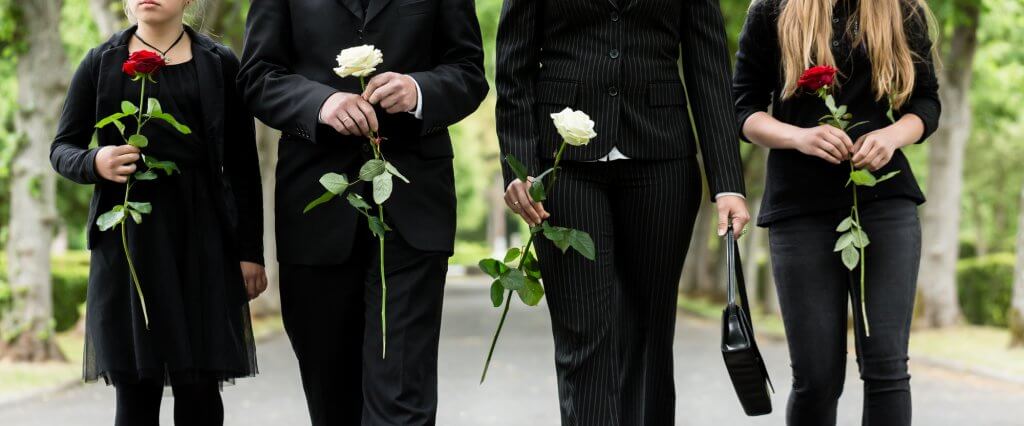It’s likely a statistical blip. Maybe it’s the phase of the moon. But after years of going without, I’ve been to four funerals in the past six weeks and have three more coming in the next few days/weeks. With one notable exception, these are “expected” deaths; parents of friends and relatives who were at the tail end of long battles with decaying bodies. But it doesn’t make the events any more pleasant or easy to observe.
I’m tempted to put in some of my many thoughts about the brevity of life and the importance of using our years on this earth for good, but this is a space to talk about communication. So I’ll focus on communication. But be forewarned – there is a rather direct message about the brevity of life and the importance of using our years on earth for good brewing within me.
Three observations and ideas related to eulogies and funerals, with implications for talks in business and anywhere else where the audience may not fully know how to respond.
1 – Express sorrow
No one really knows what to say to a grieving family. But there are clearly some things to avoid saying. Keep the message to one of support for the living and fondness for the dead. Telling relatives that they were a tremendous support and honor to the family is likely always appreciated (with the exception of when it’s a boldfaced lie). “I’m sorry” never goes out of style.
The most important part of bereavement is to be there. Presence is better than words. And while families are very grateful for the show of support in their immediate distress, it may be equally important to follow up weeks and months after the final event. A lunch, a card, a call… these all communicate “I’m sorry, and I care.” And people who look amazingly well at a funeral can fall apart the next week or month. Put a reminder on that calendar and check in later.
2 – Stories rule the day
It really should come to no surprise to anyone who has followed us for any length of time that we advocate stories to carry the message—at funerals as well as technical presentations and sales pitches. Since a funeral is primarily about comforting the family in their memory of the deceased, what better way than to relive some of the more poignant moments of the passed life? Funny or notable sayings, the path of hardship and endurance, the unexpected that only the family would know, or even a pleasant secret or two. Connections and fond memories of your own can be shared, but be careful not to make the conversation about you. Keep it focused on those whose names are in the program.
3 – Emotions are fine
I’ve seen family members get up to do the music and eulogy, and I’ve watched all elements of the service be farmed out to the “professionals”—clergy, funeral home personnel, and musicians. There is no right or wrong here. But especially when someone close to the deceased is giving a eulogy, you can expect emotions, sometimes in an uncontrollable swell. It’s not only expected, it’s perfectly OK.
It’s worth noting that apologizing for emotions isn’t something that is limited to funerals. In the past week I’ve had two people apologize for their emotions: one was speaking at a public fundraising event and the other in a private coaching call (where I was told that showing emotion wasn’t “professional.” Who makes those rules?). In both cases, my advice was the same. Never apologize for being moved and sharing what you are passionate about. Emotions are one of the easiest things to pass from one human to another, and emotions are the basis of most actions. Why should we apologize for having—and showing—them? In almost no case will the audience be offended by a show of emotion, and in most cases, they are moved and share the feeling.
Happy emotions, even laughter, are also just fine. A memory of a loved one that evokes joy and humor is a memory worth having… and sharing.
Assume the emotions will come. Take the platform prepared. Carry a tissue, or a wad of tissues. Have a bottle of water at the ready. Learn to pause and be OK with the silence. We’ll wait.
Years ago, I noted that the more important the message, the more critical it was to stay on script. Funerals might be the one place where I’m not going to take issue with reading notes. Get it right. Avoid the rabbits. Stay on message.
At the end of the day, a eulogy is just another form of communication. And the purpose and measure of success remains the same—we want the audience to be able to repeat what was said when we were done.
Sad or undesired events are no reason to abandon the principles of good communication.
Communication matters. What are you saying?
Want more speaking tips? Check out our Free Resources page and our YouTube channel.
We can also help you with your communication and speaking skills with our Workshops or Personal Coaching.
This article was published in the April edition of our monthly speaking tips email newsletter, Communication Matters. Have speaking tips like these delivered straight to your inbox every month. Sign up today to receive our newsletter and receive our FREE eBook, “Twelve Tips that will Save You from Making a Bad Presentation.” You can unsubscribe at any time.




